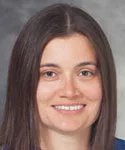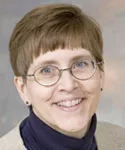In an effort to enhance support for student research, the Office of Health Professional Student Research was created within the Office of Academic Affairs, and to kick things off, it has named its leadership team.
Dr. Vera Tsenkova, associate scientist at the Institute on Aging at UW–Madison, recently took the helm as the director, and Dr. Pamela Kling, pediatrics professor at the UW School of Medicine and Public Health (SMPH), was brought on as its medical director and chair of the Medical Student Research Committee.
A large part of the program’s work will be managing the Shapiro Summer Research Program, which is designed for medical students who are interested in research but are not pursuing a PhD. Participants conduct the eight- to 12-week mentored research projects during the summer before their second year of medical school.
The program also provides a list of mentors for student researchers, as well as collaborates with the Institute for Clinical and Translational Research (ICTR).
Additionally, the revamped office, located on the fourth floor of the Health Sciences Learning Center, will now build programming to better serve all health profession students in the School of Medicine and Public Health, like physical therapy and physician assistant students.

“The continued and rapid advances in biomedical research enriches and challenges all health care providers, not only the MDs,” Tsenkova said. “Health-professional students in any field benefit from research training as a way to develop critical thinking skills that will improve their ability to interpret scientific literature and keep up with the latest advances in their fields.”
As the program’s director, Tsenkova will be responsible for the program’s day-to-day operations and will administer a portfolio of health-professional student research programs including the Shapiro program, Research Honors Program, Path of Distinction in Research, ICTR-Shapiro Medical Student Research Fellowship, the research arm of the Rural and Urban Scholars in Community Health Program, and other awards programs.
This position also organizes the annual Medical Student Research Forum and staffs the SMPH Medical Student Research Committee.

Kling will provide faculty-level support to Tsenkova, in addition to her responsibilities as chair of the Medical Student Research Committee. These responsibilities include being a liaison with ICTR and supporting research in all health- professional student research programs at SMPH. Kling will also be involved in program development and participate in student research forums.
Tsenkova and Kling were recruited to the program from different academic and professional backgrounds, but both come from the University of Wisconsin–Madison.
Kling, after earning her MD degree from the University of Iowa College Of Medicine, completed her residency in pediatrics at the University of Wisconsin. After 13 years she returned to the department of pediatrics at SMPH as an assistant professor in 2002, becoming a full professor in 2012. She is a practicing neonatologist and researcher who works in the neonatal intensive care units at UnityPoint Meriter and American Family Children’s Hospital.
Tsenkova’s background is in academic medical research. She received her PhD from the University of Wisconsin–Madison Department of Psychology. Her research focuses on the role of the social environment, psychological characteristics, and health behaviors on the risk for type 2 diabetes in adults. Her research has been supported by a five-year career development award from the National Institutes of Health. She has also received funding from the Robert Wood Johnson Foundation and has completed a three-year postdoctoral fellowship on health disparities.
The revamped Health Professions Research Office should be a great resource and opportunity for students, according to Kling.
“The medical student summer research experience has been terrific and the Shapiro program has continued to expand over time into a program that benefits medical students interested in research,” she said. “We now have the opportunity to make that program even better for the medical students. We will also expand outreach efforts to support research experiences in all health professions in the SMPH.”